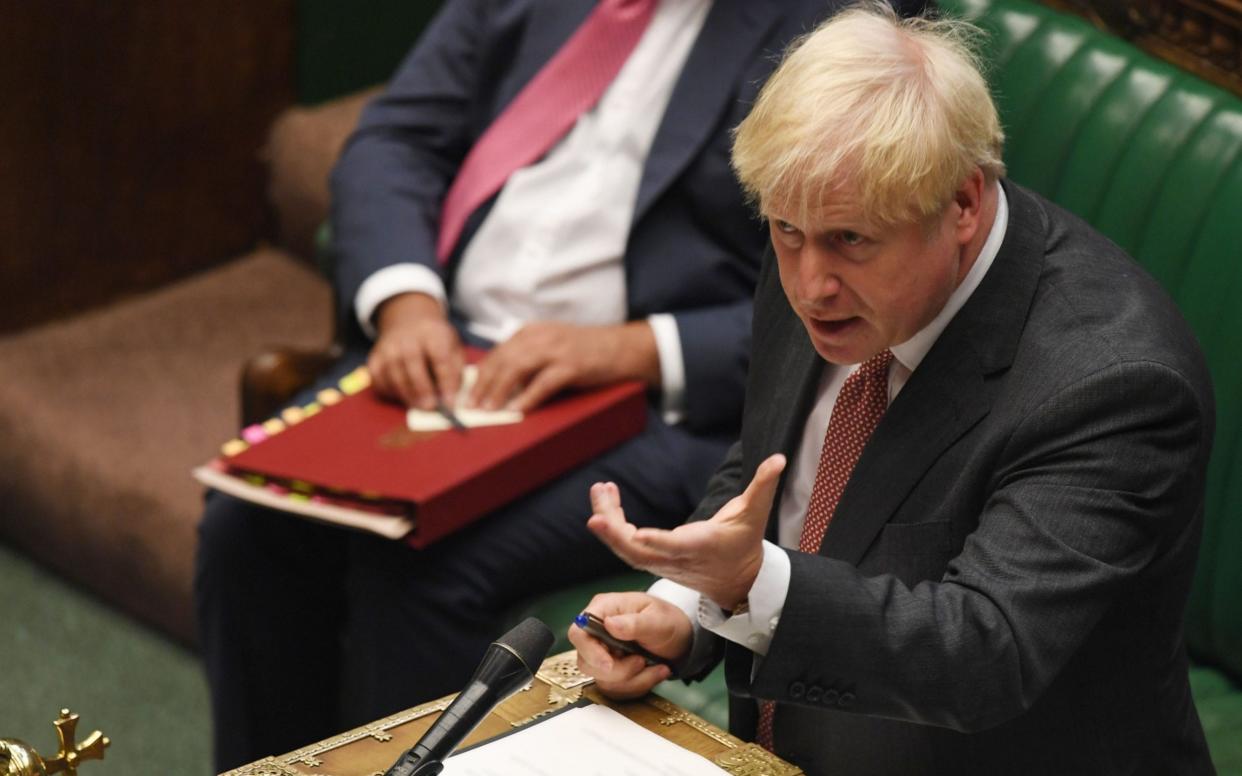Brexit's Internal Market Bill explained: what is it, and why is it so controversial?

This was first published in The Telegraph's Refresher newsletter. For more facts and explanation behind the week’s biggest political stories, sign up to the Refresher here – straight to your inbox every Wednesday afternoon for free.
What's the story?
Aroused from their slumbers with hackles up, the backbench pack were prepared to show some teeth.
It was the chairman of the 1922 committee who seemed to sum up the mood.
“If you keep whacking a dog, don't be surprised when it bites you back,” Sir Charles Walker warned before joining 29 of his colleagues to abstain on the Government’s new Brexit legislation.
Boris Johnson might have gone on to clear a crucial Commons hurdle over the Internal Market Bill, but rebels believe many MPs have simply decided to “hold their fire”.
Why is the Internal Market Bill controversial?
The controversial Bill has stoked up division inside the Conservative Party that is reminiscent of the high-stakes Brexit brinkmanship we witnessed last year.
But this time it goes further than Leave or Remain. Prominent Eurosceptics, such as Lord Howard and former attorney general Geoffrey Cox, have raised their concerns over the Government’s admission that the Bill, if enacted, would break international law.
That it would be, as Brandon Lewis, the Northern Ireland Secretary insisted, in a “very specific and limited way” did little to alleviate their fears.
To date, all living former Prime Ministers, five ex-Conservative party leaders and 30 of the party’s MPs have expressed their discomfort.
Ministers (well, most of them) are standing firm. In the Commons on Monday 14 September, Mr Johnson insisted the legislation was necessary to prevent the EU taking an "extreme and unreasonable" interpretation of the provisions in the Withdrawal Agreement relating to Northern Ireland.
The Prime Minister warned that some in Brussels were now threatening to block UK agri-food exports to the EU, and to insist on tariffs on all goods moving to Northern Ireland from the rest of the UK.
"Absurd and self-defeating as that action would be even as we debate this matter, the EU still have not taken this revolver off the table," he said.
However, Ed Miliband, shadow business secretary, repeatedly asked the Prime Minister to explain how the Bill would protect Northern Ireland from the threat of a potential food blockade.
“I know you’re a details man. Show me the blockade. I will give way to you,” Mr Miliband scoffed, but the Prime Minister merely shook his head in disdain.
Amal Clooney, the famous human rights lawyer, resigned as the UK's special envoy on media freedom in protest at the Government's plan to break international law with the Internal Market Bill. She called the Bill "lamentable".
Looking back
The UK’s internal market dates back to the early 1700s, when it was created to ensure “open and unhindered trade” across the four nations.
But when the UK joined the then-European Economic Community in 1973, most of the British trade laws were replaced by European laws.
It was Margaret Thatcher’s government in the 1980s that helped to forge the formal creation of the single market between EU nations.
It was designed to open European markets to British exporters and to level the playing field for UK firms across the continent.
Regarding all EU member states as one territory, the bloc devised rules about everything from food standards to fisheries to ensure consistency across the bloc.
The Internal Market Bill is its proposed replacement, aiming to ensure all four of the UK's home nations are not limited by regulations determined by each devolved Government.
It also aims to guarantee the international community has access to the UK as a whole, knowing the standards and rules are the same throughout.
One of the major issues is how this can apply to Northern Ireland when it shares a border with the Republic of Ireland, which will remain in the EU.
This where the controversy kicks in. The Bill could contradict the Withdrawal Agreement, and therefore international law, as it says ministers could have the power to "disapply" previously agreed rules relating to the movement of goods.
This includes those under the Northern Ireland Protocol.
Anything else I need to know?
On September 22, an amendment tabled by the Government to head off a Tory backbench rebellion was accepted without the need for a vote, clearing the Commons committee stage.
The proposal imposes a "parliamentary lock" on any changes to the Withdrawal Agreement, giving Parliament the final say on whether it is appropriate to renege on the treaty.
However, while the legislation will return to the Commons next week, ministers intend to delay its final stages in the House of Lords until after a crunch EU summit in mid-October where they hope to sign off on a trade deal.
This would likely mean that the Bill would not return to the Commons again until December, just weeks before the transition period ends.
The Refresher take
Originally Downing Street threatened to withdraw the whip from rebels who defied the Government, but made significant concessions when it accepted changes to the Bill in line with their demands.
For some, including Theresa May, it isn't enough to allow Parliament a say over whether international law is broken. There shouldn't be provision to break the law in the first place.
Boris Johnson has got his Bill through the high-stakes first-round votes in the Commons, but he might not have seen the back of the rebels just yet.

 Yahoo News
Yahoo News 
